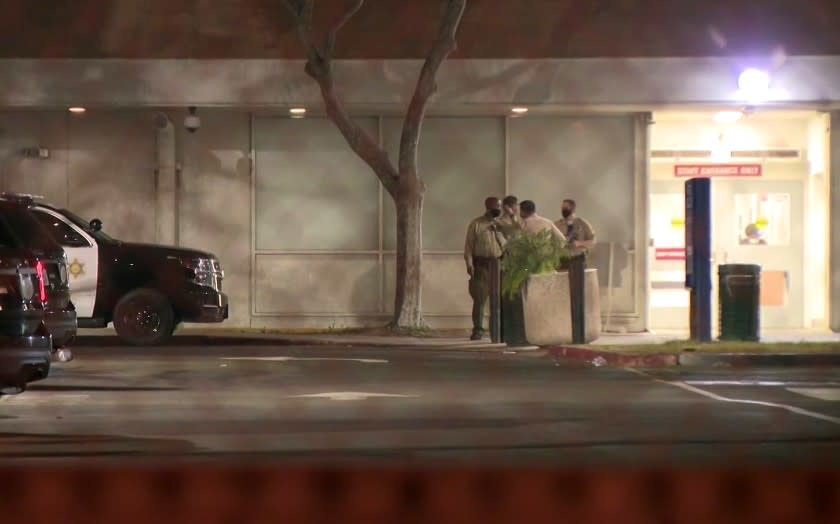Questions remain following deputy shooting at Harbor-UCLA that wounded patient

Sheriff’s officials said Wednesday that two deputies were guarding a third who was hospitalized at Harbor-UCLA Medical Center when a patient suffering a psychiatric crisis lunged toward one of them while carrying a metal medical device, prompting a deputy to open fire.
The patient, a 34-year-old man who was not identified, was struck seven times in the shooting last week and remains hospitalized in critical condition. Many questions remain, though, about how the incident escalated into violence.
The hospital’s chief medical officer and elected county officials are seeking an independent investigation while some healthcare providers called for the removal of law enforcement officers from hospitals. A group of medical workers and activists gathered outside the hospital Tuesday night to protest police violence in healthcare facilities.
“Hospitals are a place where we should be getting care,” said Mark-Anthony Clayton-Johnson, founder of the Frontline Wellness Network, a coalition of care providers working to end mass incarceration. “In that context, there should never be a reason why a law enforcement officer should use lethal force, such as a gun, on our folks.”
Clayton-Johnson, who does not work at the hospital but spoke at Tuesday's event, added: "Sheriffs shouldn't have any place responding to crises in our hospitals when trained providers are better equipped to save lives."
Dr. Anish Mahajan, chief medical officer for the hospital, said in a statement Tuesday that the patient was experiencing a psychiatric crisis Oct. 6 when he was shot by a deputy assigned to the South L.A. station who was not a member of the sheriff's unit at Harbor-UCLA.
The deputy “was on-site to provide security services for another hospitalized patient who was in an adjacent room," Mahajan said. "Multiple investigations are underway within and outside the hospital about how and why this incident occurred."
Meanwhile, he said, hospital leaders "will review best practices on how to provide security services that optimally protect the health and safety of patients, visitors and staff."
County Supervisor Mark Ridley-Thomas is seeking an investigation by the county's Office of Inspector General as well as information on the board's authority to impose restrictions or training requirements on armed officers assigned to medical campuses. Some speakers at Tuesday's Board of Supervisors meeting called for the removal of law enforcement from hospitals. Last week's shooting was the second at Harbor-UCLA in five years.
Sheriff Alex Villanueva likened the incident to a scene from a movie: "It was a scene out of 'The Shining' with Jack Nicholson," he said of the shooting.
On Wednesday, Villanueva held a news conference with a homicide lieutenant to provide a fuller picture of what they say led to the shooting.
Lt. Derrick Alfred said two deputies assigned to the South L.A. station were providing security to a wounded deputy inside a patient room at the hospital about 11:15 p.m. when they heard loud banging and screams.
One of the deputies left the room and walked down the hallway to investigate. A few rooms down, she found a patient, who was not identified, in a hospital gown trying to smash a window with a 6.5-pound compression device encased in steel, Alfred said.
The deputy directed medical staff members to remove other patients from the room, and an announcement was broadcast over the hospital speaker system summoning a crisis team, Alfred said. The deputy returned to the room of the wounded deputy and closed the door, he said.
Alfred said the deputies then heard banging in the hallway before the window of their door shattered, with the patient holding the device over his head. He struck the door again and it swung inward, Alfred said. One of the deputies stepped onto the threshold to block the man from entering and ordered him to put the object down. He then lunged forward with the device over his head, and a deputy opened fire, Alfred said. He was struck seven times in his upper body.
"That deputy was about a second or two away from getting beaned in the head with that. I'm not sure how long you want her to wait for people to gather together on the first floor of the hospital, get a plan together and go up to the fourth floor to intervene," Villanueva said when asked why the deputy intervened with lethal force when a medical team was on the way. "I wouldn't expect anybody to wait under those circumstances."
Alfred said there were no security cameras in patient rooms. The deputies were not outfitted with body cameras.
When asked why the deputy's room needed security, Villanueva said: "I think that the results of this speak for themselves, really."
Hannah Janeway, an emergency physician at Olive View-UCLA Medical Center, said she trained at Harbor-UCLA and witnessed the 2015 police shooting there. Medical staff responds daily to psychiatric emergencies — broadcast internally as "Code Gold," she said.
"During all of those we are able to get the patient deescalated, without anyone becoming hurt or losing their essential dignity as a person," said Janeway, who attended Tuesday's rally. When she is caring for an agitated patient, she said, "My first thought is how do I get the police away from this person because I'm afraid the police are going to murder them."
"They see our patients out of horror films," she added, referencing Villanueva's comment. "That's why law enforcement shouldn't be in care spaces."
This story originally appeared in Los Angeles Times.

